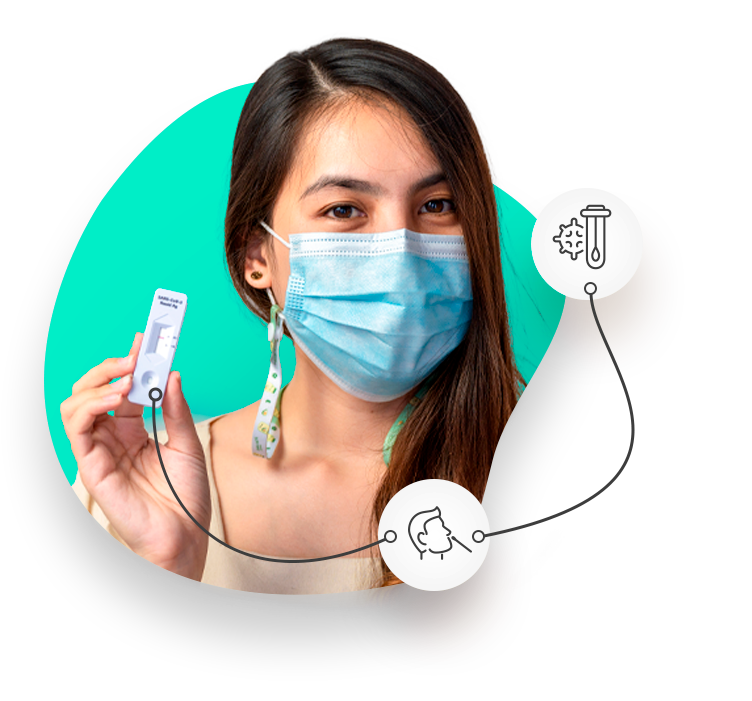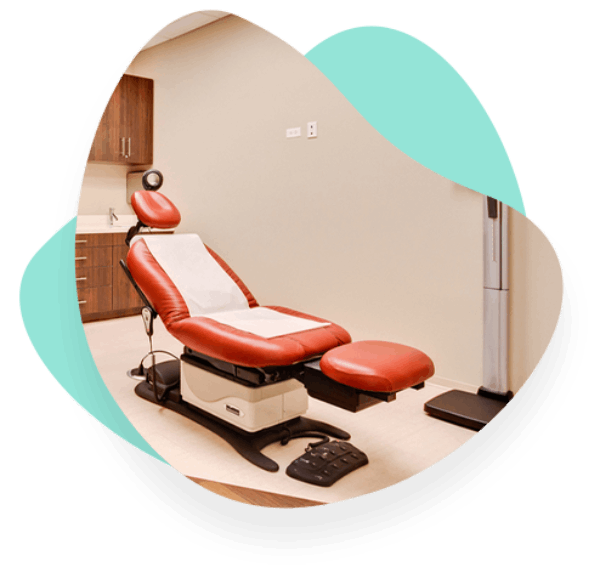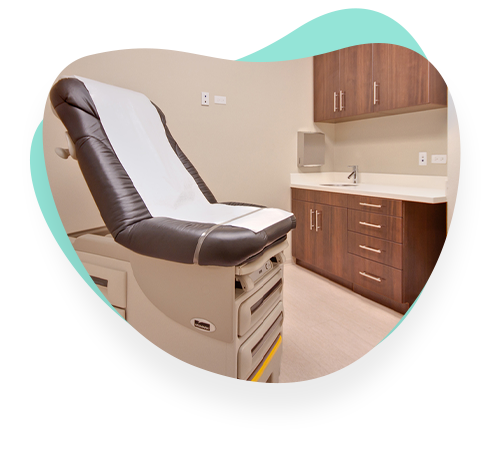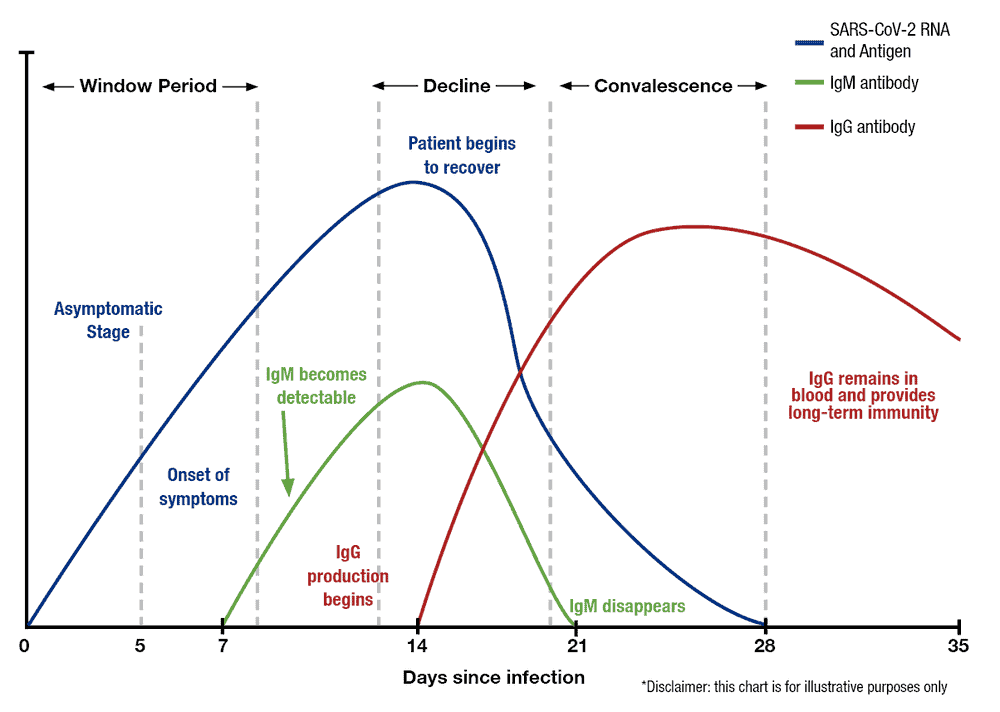When you are searching for reliable and convenient testing, Aayu Clinics is your go-to resource. Located in the heart of Chicago, our clinics are accesible to anyone searching for “COVID/FLU testing near me”. With our expert medical team and state-of-the-art facilities, we ensure a smooth and efficient testing process.
We offer a comprehensive range of antibody and antigen testing for COVID, FLU and RSV with results available in less than 48 hours.
Scheduling your tests is simple and straightforward. You can book an appointment online to visit our convenient locations at Lakeview or Wicker Park. Our user friendly booking system allows you to choose the date, time and location that best fits your schedule.

Results within 1-2 hours. Get an antigen test if you are symptomatic and need to know your status.
*Insurance copay applies. Self pay rates available
PCR results in less than 48 hours
*Available at Lakeview and Wicker Park locations. Results available in 48 hours
Results within 2-3 hours. Needed for international travel and events. Use this for symptomatic and asymptomatic testing.
*Available at Lakeview and Wicker Park locations. Restrictions apply. Self pay rates available.
Schedule your test online
Arrive at our Lakeview or Wicker Park location
Talk to our physician & get tested
*Test results sent directly to your email.
Questions? Please see the FAQ below! Call us at (773) 945-5562 or text us at (773) 900-7002.

We are performing nasal swabs for COVID PCR, antigen and antibody testing.
We are testing people with and without symptoms.
Results for PCR tests are same day if test is done before 1 pm; after 1 pm, test results are available next day.
Expedited/ Rapid PCR tests come back within 3 hours
Rapid Antigen tests return within 1-2 hours.
What Types Of Covid-19
Tests We Offer In Chicago ?
We are performing nasal swabs for COVID PCR, Nasal Swab and covid antibody testing in Chicago IL. We are testing people with and without symptoms. We can expect the rapid COVID test results within 3 hours!
To Get A COVID Test Here:
1. You’ll need to schedule your appointment online.
2. You’ll come in for testing.
3. You’ll receive results shortly thereafter.
We do our best to make COVID antibody testing as affordable as possible. We work with a very large network of insurance companies for your convenience…to all others, self-pay rates are available.
I have active symptoms and want to know if I have COVID-19
Nasal swabs – COVID-19 (RT-PCR)
I tested positive for COVID-19 and would like to know if I have antibodies
Blood test – COVID-19 lgM/lgG antibodies
I was ill and may have had COVID-19 but did not get tested. I would like to know if I have antibodies
Blood test – COVID-19 lgM/lgG antibodies

There are now two ways to test for COVID-19: one that measures the actual virus, and one that measures the body’s reaction to the virus.
The first is a genome test that detects the presence of viral genes in the body using a swabbed sample, usually taken from the nose and throat. The sample is then sent to a lab where it can be replicated and analyzed in a PCR machine. RT-PCR technology plays a role especially in the early stage of a viral infection, in which the virus reproduces quickly. Results take anywhere from one to three days to deliver. Point-of-care genome tests have also been developed that can potentially shorten this waiting period to mere minutes however, there accuracy at this time is questionable.
The second, which only recently has received FDA approval in the United States, is an antibody test, or serology test, that detects the presence of SARS-CoV-2 specific antibodies in the blood. Instead of a nasopharyngeal swab, results are obtained using a blood test. Like the nasal swab test for COVID-19 viral genes, the sample is processed in an FDA approved high-throughput lab and results come back in one to three days.
One potential use of COVID antibody tests is to measure the extent of the pandemic at the population level. Our understanding of the disease and its projected impact in the US is weakened by our inability to monitor its spread among people with either mild symptoms or none at all.
Another use is to measure the progress of individual infection. Antibody tests quantify the number of immunoglobulin M (IgM) and immunoglobulin G (IgG) antibodies in the blood. The presence of more IgM antibodies, which are the first to appear and mobilize against an invading organism, indicates more recent exposure to the virus. It is through this result that an asymptomatic carrier of the virus could be identified—a feature of no small importance, since “silent carriers” have played a major role in transmission.
More IgG antibodies, which are virus specific and produced in later stages of infection, would lead a person to test positive for immunity, implying recovery. This unfortunately doesn’t guarantee full protection. The test won’t reveal how neutralizing, or how potent, these IgG antibodies are; nor can it determine how long they will last. With certain families of coronaviruses, including the beta coronavirus family that includes SARS-CoV-2, reinfection has been found to occur, and for now it remains a possibility.
Successful deployment of antibody tests depends on their “sensitivity and specificity.” Sensitivity prevents false negatives, since a more sensitive test is more likely to actually detect it. Specificity, on the other hand, prevents false positives, since a less specific test may pick up on antibodies against a virus other than SARs-CoV-2.
It would take a concerted effort, but in the United States we have the infrastructure and manpower it takes to conduct rapid antibody tests quickly, cheaply, and at a massive scale. The small European country of Andorra has plans to give antibody tests to its entire population. Compared to other resource rich nations, we’ve failed to answer the WHO director general’s call to “test, test, test.” That can change—but only if we act now, and act fast.
ANTIGEN TESTS:
Whereas molecular tests require specialized equipment for processing samples, an antigen test is simpler, because it requires smaller devices that are easy to transport. Their design is similar to, say, a pregnancy test.
How does the test work? Antigen tests search for pieces of protein from the SARS-CoV-2 virus. The sample you provide is treated with a reagent and analyzed on the spot by a health care professional. Unlike molecular tests, these require a higher level of virus in the test sample before the test will turn positive. This means that an antigen test may sometimes lead to a false negative.
How is a sample obtained?As with molecular tests, a sterile swab is inserted into your nose or throat to obtain a specimen (see details above)—although throat swabs may be less common these days.
How accurate are they? According to the CDC, antigen test sensitivity varies depending on the time in the course of one’s infection, but is considered to have “moderate to high” sensitivity during peak viral load. Compared to molecular tests, antigen tests are more likely to generate false negative results, especially when performed on people who don’t have symptoms.
PCR TESTS:
Still, for the diagnosis of people seriously ill (with a presumed case of COVID-19), doctors will generally use a PCR test, because false-negative tests might result in inadequate treatment.
If you are traveling, you might be required to get tested, too. The location you are visiting might require a certain type of test and approved testing locations as well.
Dr. Campbell says a PCR test probably makes the most sense for travel. “You want to detect the virus early, and the PCR test is the most sensitive for that to make sure you are not infectious for your trip,” he says, acknowledging that many places require a negative COVID-19 test 72 hours before boarding a plane.
Status updated on 7-24-24
Rapid Antigen Testing for COVID/FLU/RSV will be available the same day.
PCR test results for COVID/FLU/RSV will be available within 48 hours of testing. Results sent via email. Additionally, positive results will receive a phone call.
The first thing to check if you did not get your results is your spam mail.
For same-day COVID testing near me, or PCR testing near me, simply schedule online here, and/or arrive to any one of our three COVID –19 testing sites as a walk-in. Appointments allow for a quick visit, whereas there might be a short wait for walk-ins.
Symptoms of COVID-19 appear anywhere from 2 to 14 days after exposure.
Symptoms that may appear 2-14 days after exposure to the virus:
Cough
Shortness of breath or difficulty breathing
Or at least two of the following:
Fever
Chills
Repeated shaking with chills
Muscle pain Headache
Sore throat
New loss of taste or smell
If you develop any of these emergency warning signs for COVID-19, get emergency medical attention immediately: Trouble breathing
Persistent pain or pressure in the chest
New confusion or inability to arouse
Bluish lips or face
Active COVID-19 infection Day 1-14 after symptom onset -nasal swab RT-PCR testing – allows for early case identification and informing close contacts, reducing spread at home or work.
IgG antibody response to COVID-19- after day 14- informs of the presence of an antibody response.

Variation of the Levels of SARS-CoV-2 RNA and Antigen, IgM and IgG after initial infection.
Day 1-14 since onset of symptoms: Nasal swabs – COVID-19 (RT-qPCR)
Day 14-21 after symptom onset: Nasal swab
After Day 21 after symptom onset: IgG antibody blood test for COVID-19
Antibody testing should be performed only in individuals after symptom resolution to avoid false-negative results

GO HERE or Use the above interpretation of the nasal swab (RT-qPCR) and blood antibodies (IgM and IgG) test results. Note: IgM antibodies are produced early in the active phase of infection; IgG are produced later, remain in the blood and provide long-lasting immunity
Antibody tests, also known as serology tests, differ from the nasal- and throat-swab tests that can spot a current infection. Instead, these look for signs in the blood that the immune system had fought off an infection in the past.
But there are limits to what antibodies can reveal. With other infectious diseases, antibodies signal a measure of protection against getting sick again. No one knows if that is true of this virus, or, if it is, how long such immunity might last.
A positive test result with the qSARS-CoV-2 IgG/IgM test indicates that antibodies to SARS-CoV-2 were detected, and the patient has potentially been exposed to COVID-19. When IgM antibodies are present, they can indicate that a patient has an active or recent infection with SARS-CoV-2. IgG antibodies develop later following infection, and generally do not begin to appear until 14-21 days after infection. When IgG antibodies are present it, often indicates a past infection but does not exclude recently infected patients who are still contagious, especially if detected with IgM antibodies.
Since most patients do not know the exact time when they contracted the virus, the combining both IgM and IgG tests provides a much higher test sensitivity and test specificity.
It is unknown how long IgM or IgG antibodies to SARS-CoV-2 will remain present in the body after infection and if they confer immunity to infection.
If you think you might have been exposed to the COVID-19, please set up a testing appointment at our Lakeview or West Loop Location immediately.
COVID-19 Nasal Swab RT-PCR Test: The sensitivity of this test is low in early illness, and is even lower in asymptomatic individuals, likely because of lower viral load, which means even more false negatives. The test’s sensitivity is also dependent upon obtaining an adequate sample from inside the nose. Sensitivity of RT-PCR is likely to be higher later in the illness when the viral load is higher.
COVID-19 Antibody Tests: Antibodies may not be present in detectable levels in early days of an infection. Test sensitivity increases with the time from from onset of symptoms and is more sensitive later. Delaying a test for too long may not be fruitful because at this time, we do not know how long IgM or IgG antibodies to SARS-CoV-2 will remain present in the body after the infection has been cleared.
Average incubation 5-6 days (range 1-14)
From onset to max illness – usually about a week.
Recovery is about 2 weeks for mild to moderate disease but 3-6 weeks for severe disease.
To schedule a new appointment, visit our homepage. Select one of our services and click “Book COVID Test”
Walk-ins are welcome at our urgent care clinics, depending on availability. To find a location close to you, please visit aayuclinics.com.
Having an appointment, allows for a quick visit. Yes, you will still be tested if you are late as we accept walk-ins, but there may be a short wait.
We accept most insurance carriers, PPOs, and Medicare. To find out whether we accept your insurance, please visit aayuclinics.com/billing-insurance/
You can access your test results by logging in to your account on our homepage, navigating to “My Health,” and then clicking “Lab Results.”
This website uses cookies to ensure you get the best experience. See our Privacy Policy to learn more.